What Is A Pulsate Notation?
Drum note involves a series of symbols that hold fourth dimension values and placements. Drums are unique compared to other instruments as they have their own notation. Where other instruments will read the aforementioned clefs to produce the same notes, drums make utilise of the percussion clef.
There are ii main aspects of drum notation. The starting time is orchestration and the 2d is fourth dimension values. Orchestration is where the drums are placed on the staff. Each drum and cymbal has a identify and you demand to play it when you see information technology at that place when reading.
Time value refers to how short or long sure notes are. As drums are often very busy inside bars of music, we refer to different subdivisions as points of reference. The main subdivisions are quarter notes, eighth notes, and sixteenth notes.
Drums are a repetitive musical instrument. Considering of this, many bars in a vocal will have the same pulsate beat played over and over. When drums are notated out, repeat signs in bars are used as it stops united states from having to right the same bar over and over every time it'southward played.
Repeat bars are way more than common in drums than they are in any other instrument.
Difference from a Drum Notation and a Drum Tablature
Drum tabs are much easier to read than drum notation, especially to someone who doesn't know how to read pulsate notation. Pulsate tabs will accept a beat and map it out very clearly and then that the person reading it volition know exactly what to play on each count.
A drum tab volition typically label each line and then that y'all know which line is the snare and bass etc. People use pulsate tabs considering they are quick and easy to empathize. However, once you know how to read drum note, information technology becomes more convenient to use as it offers more diversity and lets you aggrandize on ideas.
Understanding how to hit the drums
In its most bones form, drum note will tell you which drum to hit and how long to wait earlier you lot hit it. Nonetheless, it can get way more in-depth than that and offer more direction for how to play. The directions come in the course of dynamic and technique markings.
Drum Techniques and Signs:
Accent Drum
An emphasis on a drum will typically be marked by a greater than symbol. When yous see this on pinnacle of a note, it means y'all need to play the annotation louder than the other ones in the bar. You'll typically see these accent signs when playing backbeats or stiff off-shell rhythms on the hullo-hat.
The contrary of an accent in drumming would be a ghost note. This refers to when you strike the drum incredibly softly. Ghost notes are indicated past a fix of brackets around the notation.
Ghost notes are nigh commonly played on the snare drum. However, they can be notated on other drums as well.
A flam is when you hit both easily together, but one hand will strike the pulsate slightly before the other. Flams are notated by having a smaller note in front of the main note. Information technology's of import to know that the smaller note is attached to the master note and doesn't hold whatever extra value in terms of counting in the bar.
A cross stick is when you lay your stick across the snare pulsate and striking the rim with the shaft of the stick. Cantankerous sticks are sometimes referred to every bit rim clicks. They're represented in notation by having an 'x' on the snare line.
Understanding how to striking Cymbals
Earlier we look at where the cymbals are placed and how to hit them, information technology's important to know that many people don't concur on cymbal note, meaning it's oft unlike depending on where you're reading it from!
A crash volition typically be notated past having a circumvolve around the 'ten'. Information technology will sometimes be on elevation of the line while other times information technology volition exist written even higher on what is called a ledger line. When hitting a crash, you lot demand to hit it diagonally instead of head-on equally it volition preserve the life of the cymbal. Cymbals that are hit directly-on will crevice faster.
The hi-lid will e'er exist marked as an 'x' above the top line on the staff. There are unlike ways to strike the hi-lid to produce different tones. Hitting the top of the hi-lid will give a subtle chick sound while hit the shoulder will produce a more aggressive sound.
When notation tells yous to choke the crash cymbal, it volition commonly just have the word 'asphyxiate' written underneath the staff. Choking the crash refers to when you striking it and and so grab information technology with your hands straight afterward.
A people's republic of china cymbal may be indicated by a similar cymbal to the crash, still it volition be placed on a higher ledger line. China cymbals are a lot more aggressive sounding than crash cymbals, significant drummers don't play them as often. You should hit them the same way you hit a crash in order to preserve the life of the cymbal.
Splash cymbals typically aren't notated in pulsate notation. It's generally up to the drummer to decide whether he hits a splash cymbal or a crash cymbal. Equally the splash cymbal is a lot smaller than other cymbals, there'southward no other way to hit them other than head-on.
An open hello hat is represented by placing a small circle just above the hi-lid symbol in the note. To play an open hi hat, you need to lift your foot off the pedal.
An open hi lid is represented past placing a small circle just above the hi-hat symbol in the notation. To play an open hi hat, you demand to lift your foot off the pedal.
Other Techniques:
Rolls
Drum rolls are played on the snare drum. They're typically referred to as fizz rolls. They're notated with a small 'z' on the stem of the snare drum note. To play them, you need to buzz the sticks into the snare and alternate your easily.
Accented Rolls
An accented curlicue will be the aforementioned as a normal roll. Nevertheless, information technology will accept some sort of accent marking. The notation may tell you to start soft and get louder or vice versa.
1.Ho-hum Down
When reading music, it'due south vital to accept it slowly. The slower you lot play, the easier it is to read notation. Once y'all become accepted to the parts you're reading, and then you lot can play it a little faster.
2. Count Out Loud
Counting out loud is i of the all-time ways to make sure you're playing the notes properly and waiting long enough earlier playing the adjacent note. Sometimes it helps to even write the counting above the notes on the canvass music.
3. Do Regularly
If reading music becomes part of your regular practice routine, your reading abilities will ameliorate drastically over time. The more than y'all read, the better you'll get at information technology.
four. Play to Songs
Find total songs that accept been transcribed and play forth to them while following the sail music. Information technology's a fun style of reading pulsate note.
five. Write Things Out
Notice some music notation software and attempt to write drum parts out yourself. It'south a keen fashion of figuring out how things are written.
six. Teach Someone Else to Read
Teaching is the all-time way to learn something. By teaching someone else to read sheet music, you'll go a more than firm grasp on it yourself.
7. Have Fun!
Realize that reading drum sheet music isn't a chore. It's a useful tool to take that volition get you very far in your musical journey. Have fun while reading and always seek to discover some new materials to acquire from.
Conclusion
Many drummers debate with themselves whether they need to acquire how to read drum music. Our advice is to take the step and acquire. You'll be a meliorate drummer for it. Information technology will unlock pathways that you wouldn't have had if you weren't able to read music.
Whether it be the ability to learn new songs quickly or the potential for earning income from educational activity others to read, sail music reading should be a vital skill in whatever drummer's arsenal.
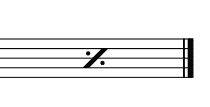
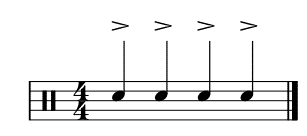
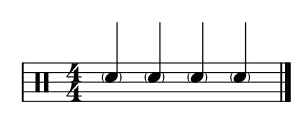
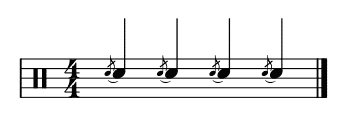
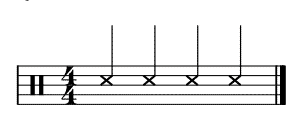
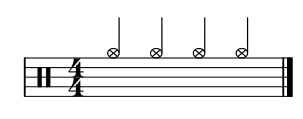
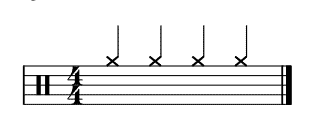
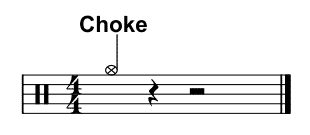
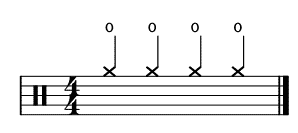
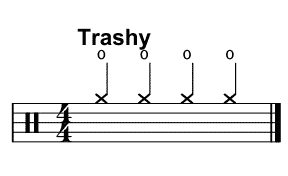
0 Response to "How to Read Sheet Music for Snare Drums"
Post a Comment